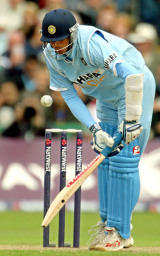Part of a method or plain madness?
The decision to drop Rahul Dravid appears to be one based on the present and not on the future
27-Oct-2007
|
|

|
Two years ago, on another October evening, a day after another Challenger Trophy, the national selectors decided to "rest" another former Indian captain. Sourav Ganguly, then out with a mild injury, was left out of the Indian squad for the first two matches of the home series against Sri Lanka and needed to wait another year and a half before his next one-dayer.
Now it's Dravid who faces the brunt. "Rest" is a commonly used euphemism in Indian selection circles and what it means is anyone's guess. Dilip Vengsarkar, the current chairman of selectors, has said Dravid "will be back soon" but also added "fitness and fielding have become very important in the one-day game, so he will have to show it playing for his state". Logic suggests that Dravid has been dropped for his fielding. If true, there will be a few in the squad dashing to the nearest gym. Incidentally Dravid's replacement, Virender Sehwag, is no Asafa Powell and has done little to deserve a recall.
"Rest" tells you nothing about the selectors' motives. Have they decided to give Dravid a break so he can regain his form? If so, will his performance in a four-day Ranji Trophy match tell them anything? Do they have a plan to phase out the senior players? If so, will Ganguly and Sachin Tendulkar be rested too? Have the selectors even kept Dravid in the loop? Has serious thought been given to the balance of the side? If so, why are there five openers in there?
Or have they simply realised that Dravid is the most expendable option? If that's the case, it's a decision based on the present and not on the future - on the evidence of only one poor series against the best one-day side in the world (all talk of his lean phase in England can be quashed by pointing to his two good half-centuries, one of which was a match-winning unbeaten 92 in Bristol).
An average of 8.88 in ten games is a cause for concern but numbers can only tell you so much. India, it seems, are too caught up in the Twenty20 dizziness, forgetting that a technically sound middle-order batsman is an integral part of a one-day team. As Australia so conveniently exposed, flashy thirties can only take you so far. It is beaver-like innings-building that wins games. It just needs a Mohammad Asif or Mitchell Johnson to rip through the top order for the fragile underbelly to be put in a spot.
More importantly, who replaces Dravid? Who can enter at 20 for 3 and see off the new ball? Who can walk in at 160 for 4 and launch a 300-plus total? Who, especially while playing in the large arenas in Australia, can find the gaps with such ease? Rohit Sharma may develop into such a batsman in the next few years, but the top-heavy nature of the side means he will struggle to even make it to the playing XI in the upcoming series.
India's selection history is littered with instances of great players being abandoned, and Vengsarkar and his band might just have carried on the tradition. Players of such quality require a certain leeway and need to be judged on the body of their contribution rather than a series or two. Just a month and a half ago Dravid was being urged to revoke his captaincy resignation. Now he's dispensable. Is there a method in place or are we to assume it is plain madness?
Whatever the reasons, one can't help thinking that the selectors have chosen an easy escape route. Leaving Dravid out isn't a decision you assume would provoke public outrage - one doubts if any effigies have ever been burned in his support - and even if it did, a victory or two would douse the fires. Somewhere along the line, when his side are inserted on a juicy pitch, Mahendra Singh Dhoni will look around the dressing room for someone who can curb his flashy style and do the dirty job of scrapping hard. Finding no one to fill the breach, he might look back on today's selection meeting and ponder about what might have been.
Siddhartha Vaidyanathan is an assistant editor at Cricinfo